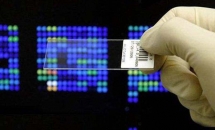Chronic lymphatic leukaemia is the most frequent form of leukaemia in adults in Western countries, and shows a highly heterogeneous clinical presentation and evolution. Little is known about the mechanisms that cause the disease. Our knowledge of the human genome and the development of new technologies for sequencing DNA allow us to study the genetic alterations of tumours in greater depth. Recently, a Spanish consortium was created to study the genome of this form of leukaemia, and which includes multidisciplinary groups that allow a global study of the disease ranging from epidemiology and clinical studies to molecular biology and bioinformatics. Early studies of the genomes have shown the complexity of this leukaemia, with a great diversity of mutated genes, but which appear to point to a relatively limited number of mechanisms involved in their development. This information also offers new targets for the development of innovative treatments.
Cycle: Challenges of the 21St Century the Voice of Medicine, II
Organized by: Residence for Researchers, Fundació Clínic Barcelona, IDIBAPS and RESA
